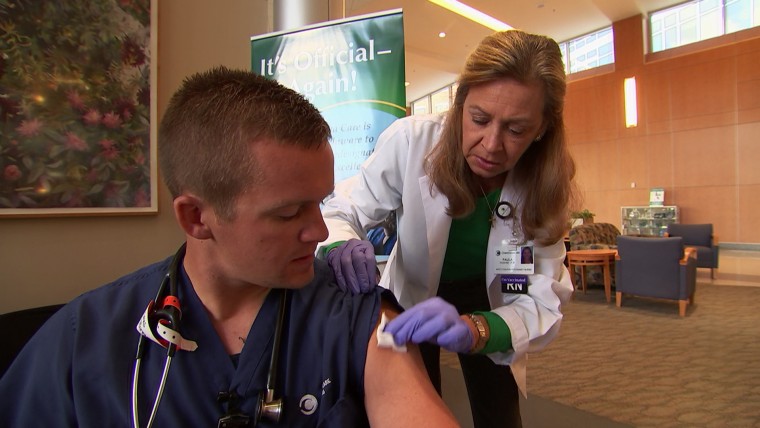This year’s flu vaccine is one of the most effective in years, the Centers for Disease Control and Prevention said Wednesday.
So far, people who got the vaccine were 59 percent less likely to get sick with influenza than people who didn’t, the CDC said.
"This means that getting a flu vaccine this season reduced the risk of having to go to the doctor because of flu by nearly 60 percent,” said the CDC’s Dr. Joseph Bresee. "It’s good news and underscores the importance and the benefit of both annual and ongoing vaccination efforts this season."
Flu usually hits the very young and the very old the hardest. Depending on the season, it kills anywhere between 4,000 and 50,000 people a year in the United States. CDC recommends that just about everyone get a flu shot every year but usually only about half of Americans do.
And flu vaccines are among the least effective vaccines available, because flu viruses mutate so fast.
"This means that getting a flu vaccine this season reduced the risk of having to go to the doctor because of flu by nearly 60 percent."
The 60 percent efficacy rate is similar to most years when the vaccine closely matches the circulating flu viruses. That hadn’t been the case lately — in 2014, the viruses that were most common mutated or “drifted” before vaccination could even begin, and last year the vaccine was only 23 percent effective.
The flu vaccines on the market deliver a cocktail to protect against three or four strains of flu. It takes months to make flu vaccines and they have to be formulated freshly every year.
Right now, vaccine advisers are meeting to try to decide which strains should go into next season’s flu vaccine, even as this flu season is just getting under way.
CDC experts told the vaccine advisers that this year’s formula provided 51 percent effectiveness against the H1N1 viruses responsible for most flu illness this season. They reduced illness from influenza B viruses by 76 percent. The vaccine also protects against H3N2 flu but there haven’t been enough cases of H3N2 yet to determine how well it’s worked.
“This season, influenza-like-illness levels and the numbers of influenza-positive laboratory tests became elevated the week ending January 16. Activity now has been elevated for five consecutive weeks,” CDC said.
Flu seasons are usually about three months long.
"Flu activity this season started a bit later and has been lower so far than we've seen during the previous three seasons, but activity is still on the upswing and expected to continue for several weeks," Bresee said.
CDC and the vaccine makers are working to come up with better flu vaccines that can be made faster, and eventually, for vaccines that could protect against all strains of flu.
More than 170 million doses of flu vaccine are expected this year, with options ranging from traditional shots, to a nasal spray and a high-dose version for seniors.

